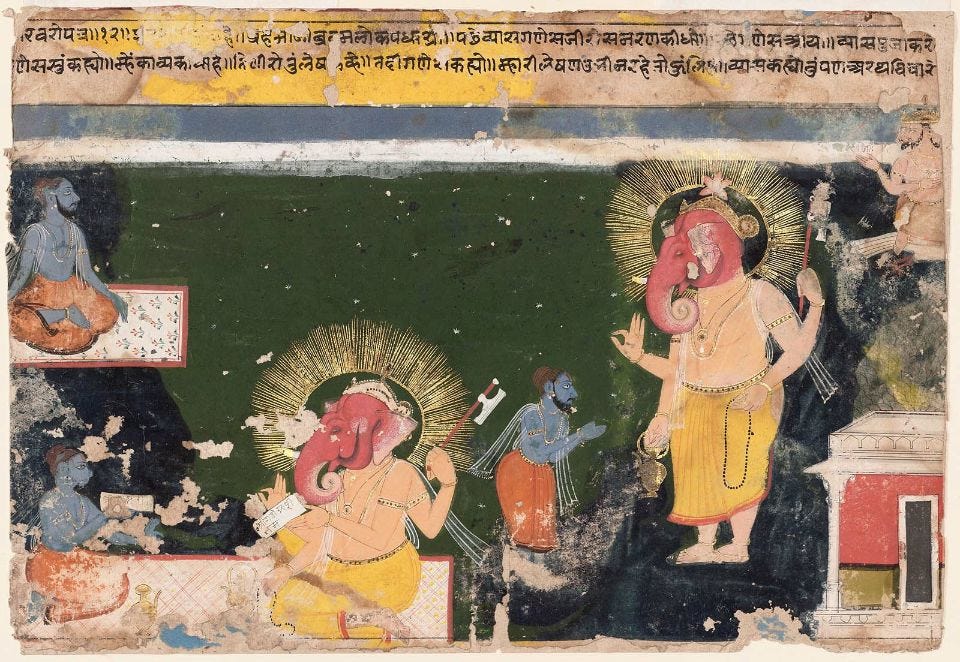Jayary Newsletter # 102

Sacrifice and Deep Embodiment
I am going to retire the term "Deep Embodiment" in a minute; it's a phrase better reserved for research papers, but one final academic rant before I set it aside.
The fundamental idea of deep embodiment is that any liberation we can hope for is liberation in this world. I want to highlight this point because the Indian philosophical and religious traditions are often caricatured as other-worldly, an impression that's been actively supported by Indians seeking an alternative to western dominance. "Western Body, Eastern Mind" goes some way to capture this caricature, pointing to a shangri-la tilled by massive industrial combines under the benevolent gaze of orange robed mystics.
I don't believe that caricature one bit. An abstract belief in a supernatural god is otherworldly. In contrast, karma is central to every major Indian tradition. There's nothing otherworldly about karma. Even better: if we are in some other world, we will be subject to that world's karma. In short, karma is the logic of deep embodiment.
No wonder that sacrifice plays such an important role in Indian religion: sacrifice is the means through which we work through the dross of this world. The Jaya is the longest sacrificial manual in the world. Unfortunately, there's no going around the fact that sacrifices are often literal: sacrifices of the flesh. Which brings me to my next Jayary topic: the relationship between violence and dharma.
Universal Violence
The first major event in the Jaya is the snake sacrifice. The snake king Takshaka is the ostensible target of the sacrifice but Janamejaya is persuaded to take genocidal revenge for his father's death by killing every snake in the world. Isn't that what Dubya did: taking revenge on all of Iraq to get at Saddam Hussein?
The revenge part should be familiar to us, but why organize a sacrifice to do so? Why not go out and shoot every snake you can find? Or marshall your forces for a war against the snakes? If anything, the Jaya reverses the relationship: the war between the Pandavas and the Kauravas is subsumed within the larger history of sacrifice.
Why is sacrifice so important? It's got to do with violence.
Siddhartha leaves home because the reality of suffering hits him in the face; but that suffering is a bit passive isn't it: sickness, old age, i.e., events that feel natural as opposed to intentional. But sickness and old age aren't the only way we suffer: we also suffer from wars and famines, and if we look far back into prehistory, we also suffered from predation. It's not just suffering that colours our world: violence is at its core.
What can we do about universal violence? One answer: organize sacrifices.
Sacrifice and the Law
Sacrifice is a generative concept, just like the concept law.
There are laws everywhere: we have laws that govern human affairs, we have the concept of divine law and we have the laws of nature. These laws vary in their ferocity, from the absolute commandments that God gave to Moses (or the axioms of set theory for that matter) to the humanly interpretable laws that govern the complaints that fill our courts. We consider a body of work to be a science to the extent that its findings are captured by laws.
Sacrifice is similar. While its origins might lie in specific rituals, there's a clear sense that the sacrifice transcends any specific domain. When interiorized, it becomes yoga. When exteriorized, it becomes the wheel of the dharma. If karma is universal, so is sacrifice, for it's in sacrifice that karma is created, maintained and destroyed.
Having grasped the concept of the law, we are obsessed with ensuring that it delivers on its original promise: a complete, consistent and certain system for grasping the world. Now we know that isn't possible. The law breaks down when you take it to its limits.
What is the corresponding promise for sacrifice? I don't know, but it can't be certainty. Unlike the law, sacrifice isn't infallible. Having eliminated Jarasandha and conducted the rajasuya, Yudhisthira should have remained a chakravartin for ever. Instead, he's in a forest wearing bark.


